Information rights are ultimately about people – relationships, trust, equality, democracy and dignity.
At the ICO, we value what makes us unique, to better understand and serve our customers, society and the economy. This means the ICO as a workforce, employer and regulator must be equal, diverse and inclusive. We’re making sure equality, diversity and inclusion is a thread that runs through every aspect of the ICO.
How we define equality, diversity and inclusion at the ICO
Equality means giving people access to opportunities and acknowledging the historical imbalances in different groups.
Diversity means acknowledging and valuing difference, as well as representation, individuality and diversity of thought and perspective.
Inclusion means us enabling everyone to make a difference, through providing a sense of belonging, psychological safety and feeling valued.
Our objectives
Our high-performance strategy, values and behaviours outline our ambitions for equality, diversity and inclusion (EDI). Our EDI objectives outline our intent and key priorities to enable our ambitions.
Our EDI objectives cover three areas. They are supported by our EDI action plan. The action plan details what we will deliver, by when, who is responsible for delivery and how we will know we have achieved our objectives.
Objective one – we will represent the communities and societies we serve
We believe that diverse teams make better decisions, boost creativity and innovation, enable greater professional growth and increase our understanding of the communities we regulate. As a workforce, we are the most effective and have the greatest impact when we are representative and consider different perspectives.
We will achieve this objective by:
- having diverse recruitment panels and an accessible hiring process, to attract and recruit people with diverse skill sets, perspectives, experiences and backgrounds;
- developing our estates strategy, offering working spaces in diverse cities across the UK to support recruitment and retention;
- recognising socio-economic diversity by embedding and encouraging non-traditional routes to join our workforce, including return-ships and apprenticeship programmes;
- using people data to help us understand our workforce demographics, socio-economic groups and identify and remove barriers that stop particular groups from being hired, progressed or developed;
- reducing identified pay gaps, with primary focus being for ethnic minoritised, and female employees;
- maintaining a positive disability pay gap;
- encouraging diverse perspectives through consultations before making decisions on people and transformation initiatives; and
- investing in a fair and inclusive career progression process and our reward frameworks so that we can develop and retain our best people.
Objective two – our culture will be inclusive
We’re at our best when we support and look out for one another, and when we trust and empower each other to be ourselves. That applies whether it’s within the workplace or in the work that we do.
We have measures in place to support our diverse workforce, such as reasonable adjustments. However, we will do more to remove the barriers that are preventing people from developing and progressing.
We will achieve this objective by:
- supporting those who lead teams to understand what we expect of them, and ensure they have the tools to lead teams in an inclusive way. All people who lead teams will have completed Promoting Inclusion training, and have access to our inclusive toolkit and policies;
- making sure all of our people have completed Promoting Inclusion development. This shows we are all clear about what inclusion means for us at the ICO, and how to achieve it;
- providing a leadership development programme that will develop capability in five key areas, which are:
- inclusive hiring;
- active anti-discrimination leadership;
- managing reasonable adjustments;
- understanding the impact of menopause; and
- enabling neurodivergent people.
- supporting all our people to demonstrate how they show inclusion in their day-to-day work and team interactions through the Performance Development Record (PDR) and pay progression processes;
- sharing colleague stories, including their personal experiences, and celebrating and raising awareness of significant EDI days and events;
- having clear and accessible communications, in multiple formats, for all our people to understand and engage in all our work;
- exceeding our legal obligations, collaborating with our public sector peers to lead best practice in EDI; and
- ensuring we embed equality impact assessments in our change process.
Objective three – We will better understand the needs of everyone to deliver services that are accessible to all
We target our regulatory interventions on the areas of greatest harm and to make a real difference to people’s lives. Technological innovation by businesses means the landscape we regulate is constantly transforming. We know we’re at our best when we understand the needs of all our customers, including those who experience vulnerability and communities of unmet need.
We will achieve this objective by:
- making sure our communications and stakeholder engagement reflects and actively reaches those communities and people that are at risk of suffering greatest harm;
- using our insight from engaging different communities to inform our future work;
- making sure our customer and stakeholder engagement tools are accessible and consider our Public Sector Equality Duty (PSED);
- focusing our research on developing a better understanding of the needs of the communities we aim to serve;
- actively considering EDI within our procurement tendering process, making sure each delivery partner is committed to advancing EDI in their own work, and understands our objectives;
- aligning our regulatory work to our EDI objectives and considers our PSED and Section 75 of the 2010 Northern Ireland Act;
- making sure our customer and stakeholder-facing services are accessible and in line with the outcomes of our equality impact assessments and best practice;
- actively considering and seeking to increase the diversity and inclusivity of our expert stakeholder and speaker panels that support our regulatory work and external events; and
- ensuring our communications promote the impact our regulation work has on different groups, both publicly and internally.
Our equality, diversity and inclusion targets for 2028
The below information shows our EDI workforce demographic targets for the ICO to achieve by 2028.
We recognise that our ICO target for female representation for all employees is 9% above the UK census data, and we celebrate this. We are a flexible employer with a vast amount of part-time roles and great benefits. As a result, we attract, retain and support primary caregivers. According to Carers UK (2021), 59% of caregivers are female. At the ICO, not all primary carers work part-time, and not all part-time workers are carers. However, we recognise the correlation and have set a target to retain these vital groups of our workforce.
The data below includes the 2021 census UK demographics for the three groups the ICO have captured sufficient data against to benchmark against:
ICO target |
Top three grades target |
United Kingdom |
|
Sex |
60% of employees are female | 51% of the top three grades are female | 51% of the UK population is female |
Ethnicity |
18% of employees are from an ethnic minoritised background | 18% of top three grades are from an ethnic minoritised background | 18% of the UK population are from an ethnic minoritised background |
Disability |
18% of employees have a disability | 18% of top three grades have a disability | 18% of the UK population have a disability |
Our EDI governance model
Everyone has a part to play in embedding our EDI objectives. Here we define who we will consult with, who is responsible and who is accountable for making sure we achieve what we say we will.
Consultation groups
- EDI steering group
- People Manager Briefing Group
- Employee Forum
- Trade unions
Provide strategic EDI challenge and direction
- EDI Board
- People Committee
Responsible for EDI objectives
- Everyone at the ICO
- Those leading teams and people
Accountable for EDI objectives
- Executive Team, Senior Leadership Team
- People Services, Regulatory Supervision, Strategic Communication
Our progress so far, 2020-2023
EDI has been a priority for the ICO in recent years. Whilst we acknowledge that there is still some way to go, we are proud of the steps we’ve taken. We have developed our strategic intent, led transformational activity in our hiring and progression processes, improved workforce demographic data collection, and increased our communications about EDI.
Through the development of ICO25, we maximised our opportunity to develop our values, to ensure a value on inclusivity becomes a key attribute to enable progression of our EDI objectives.
We continued to focus on diversity of thought and perspective. We have achieved increases in black, Asian, and ethnic minoritised representation at senior levels of the organisation since March 2020.
Further to this, we committed to ensuring that women and women experiencing menopause symptoms, people with disabilities, neurodivergent people, and LGBT+ colleagues feel included, heard and supported at work. We did this through establishing the EDI steering group as a feedback and consultative forum.
We continued to provide our people with an inclusive and accessible work environment, providing the most efficient IT equipment to help meet a range of needs. We now promote flexible and part-time working in all our job vacancies and encourage a healthy work-life balance. This has allowed our people to work in the way which best suits them, whilst continuing to meet business needs. This approach has been particularly important in our response to the COVID-19 pandemic, giving people greater control over where and when they work.
We have developed our future ways of working and moved to a full hybrid working model. We have developed guidance for all our people on inclusive behaviours and managing meetings. This includes suggestions to help team members contribute effectively regardless of where and when they are working and ensure equity of voice and contribution for all.
To support colleagues’ health and wellbeing, we have offered over 20 learning courses. These range from supporting people through change to promoting inclusion in the workplace. We have also:
- offered free fruit in offices, a one-off supermarket voucher worth £50, access to free period and hygiene products and access to an essentials pantry that offers non-perishable food items;
- given more control to employees on how they manage their finances through salary advances and selling and buying of up to 10 days annual leave each year;
- encouraged use of flexi-leave which allows up 26 days additional leave per year;
- bi-weekly wellbeing mindfulness sessions;
- increased awareness of our existing employee benefits resulting in an increase in sign-ups, with now over 50% of the organisation benefitting;
- introduced financial awareness sessions; and
- increased awareness of external support and advice, such as Citizens Advice, The Charity for Civil Servants, The Trussell Trust and Samaritans.
We continued to work towards achieving greater diversity in our workforce, both in terms of our overall demographics, but also at senior leadership levels.
We have improved our recruitment processes, by:
- developing our external ICO careers page, being explicit about our commitments to EDI;
- removing personal details from application forms and CVs;
- removing the necessity for having a degree for the majority of our roles, opening up opportunities for us to attract people who have gained experience via non-traditional routes;
- advertising roles as full-time and part-time with flexible working and hybrid options; and
- sharing interview questions prior to the interview.
We continue to support flexible working patterns by increasing awareness for managers and planned events to support varying working schedules. We are mindful of key EDI dates and regional public holidays when planning.
We have improved our workforce demographics through increasing our representation of people who have a disability at our top three grades from 4.1% to 8%. Across the organisation, we have improved representation from 6.4% to 7%.
% of all staff who have a disability
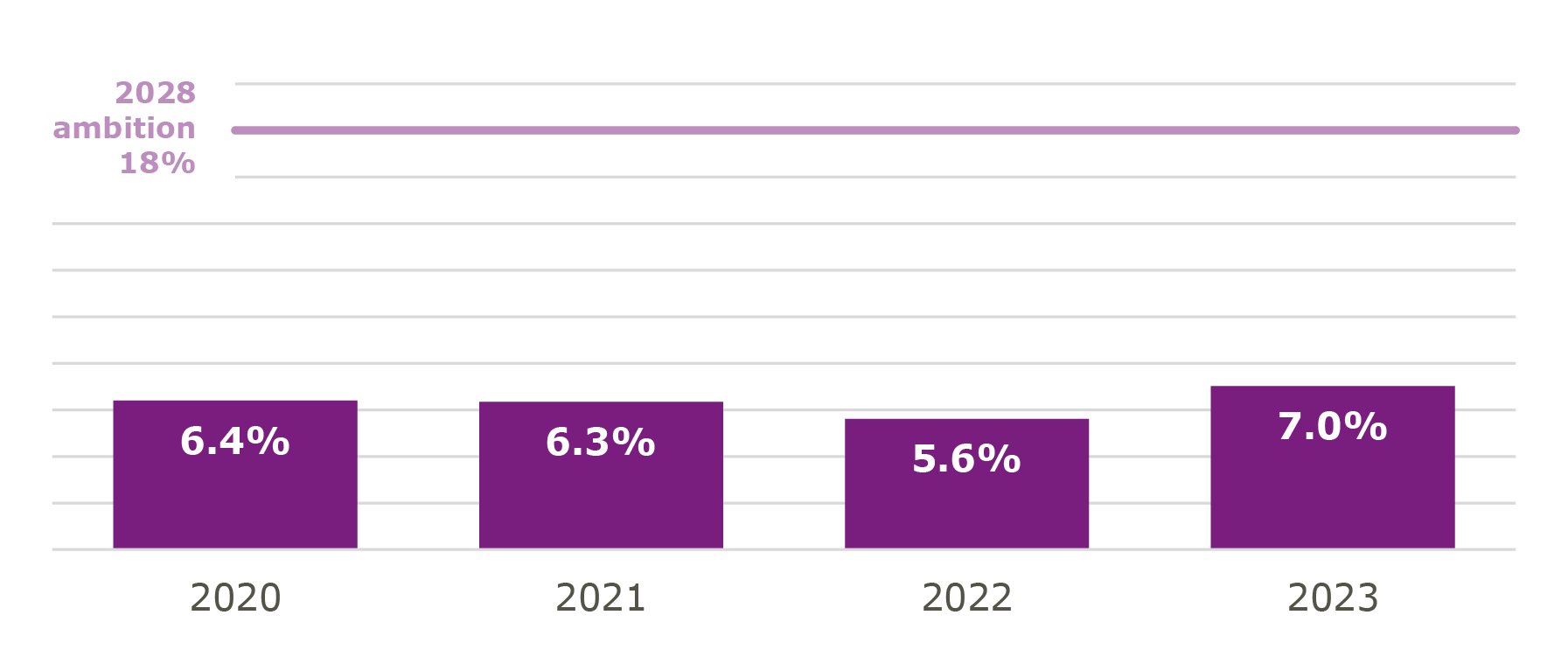
% of G, G2 and H staff who have a disability
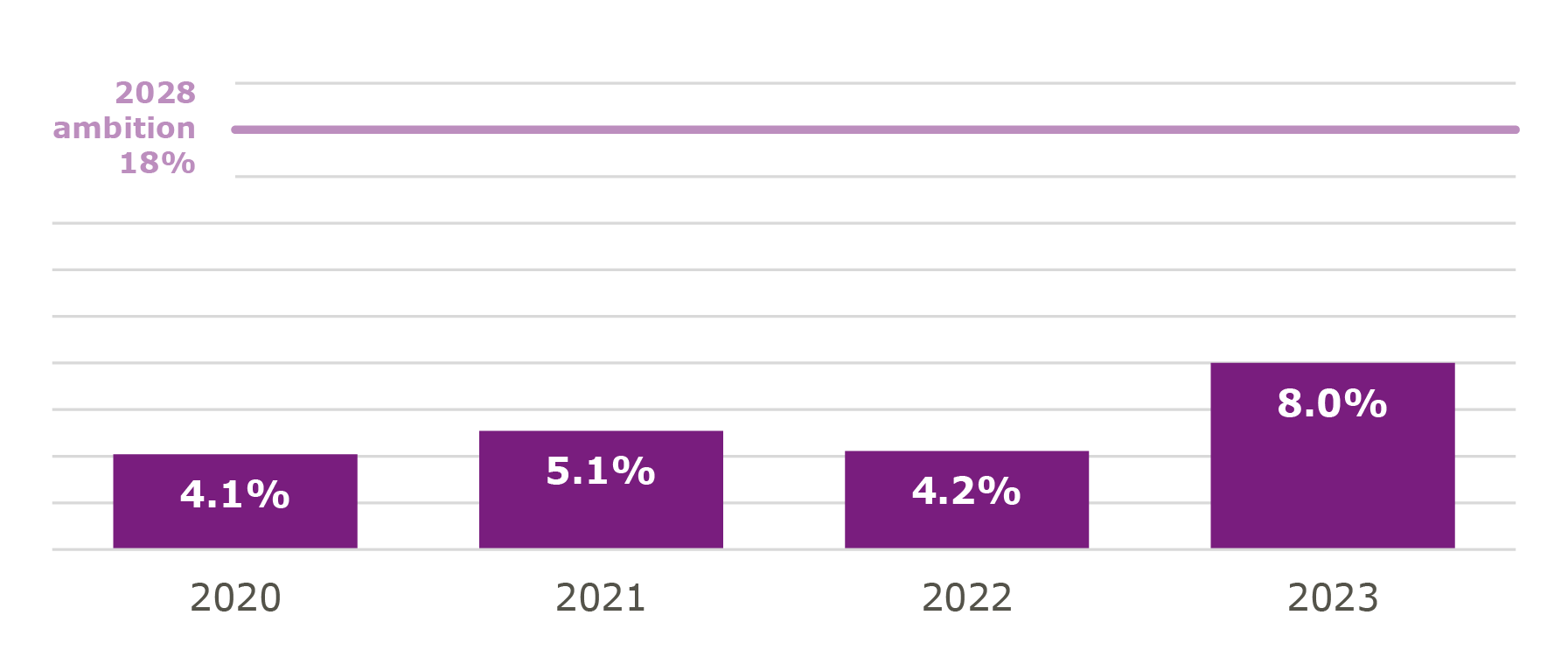
Ethnic minoritised representation increased from 0% to 10.8% at our top three grades, and from 6.5% to 9.7% for the whole organisation.
Ethnic minority representation at the ICO
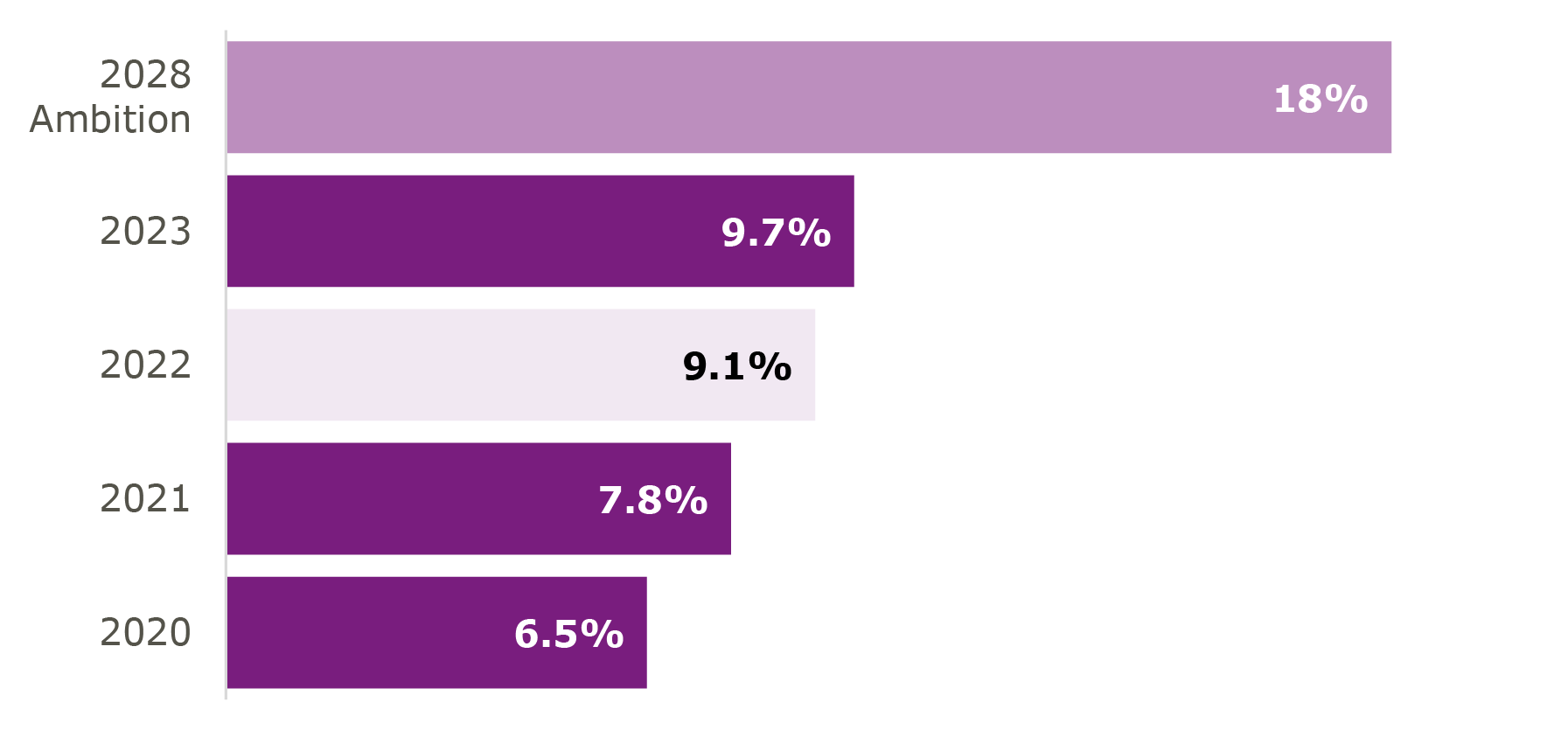
Ethnic minority representation at the top three grades
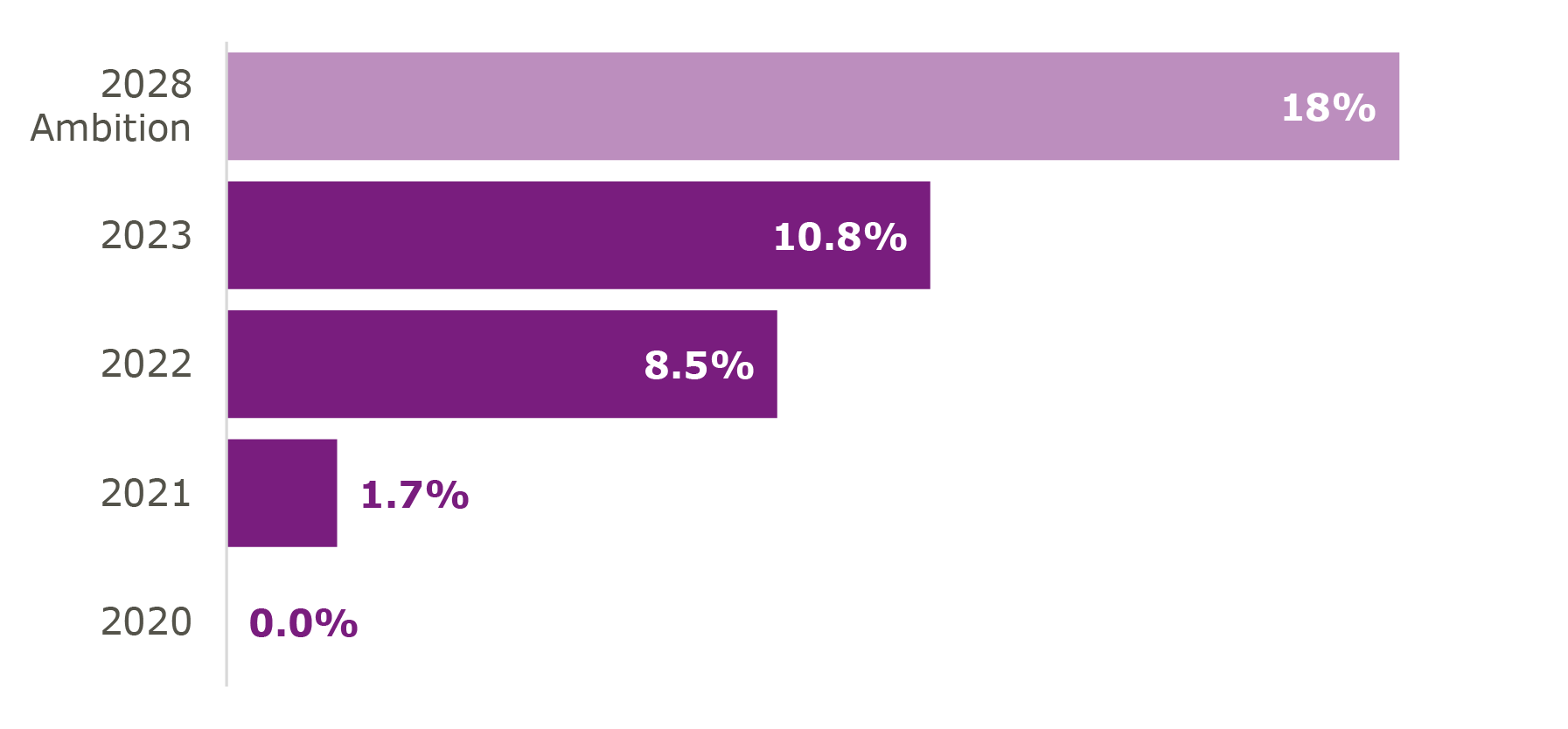
Female representation increased at our top three grades from 49% to 52%. We maintained our female representation at 63% for the whole of the organisation.
Female representation at the ICO
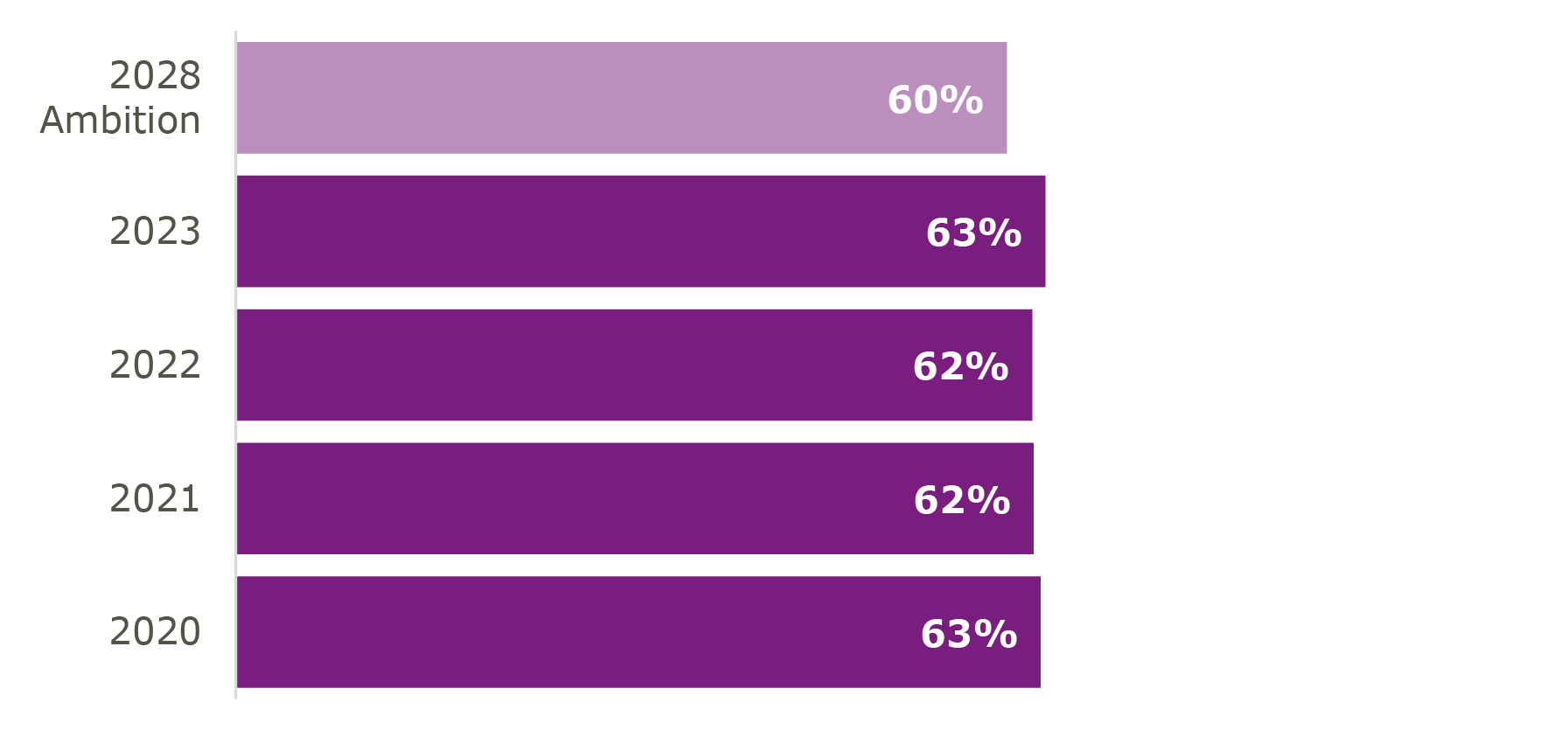
Female representation in the top three grades
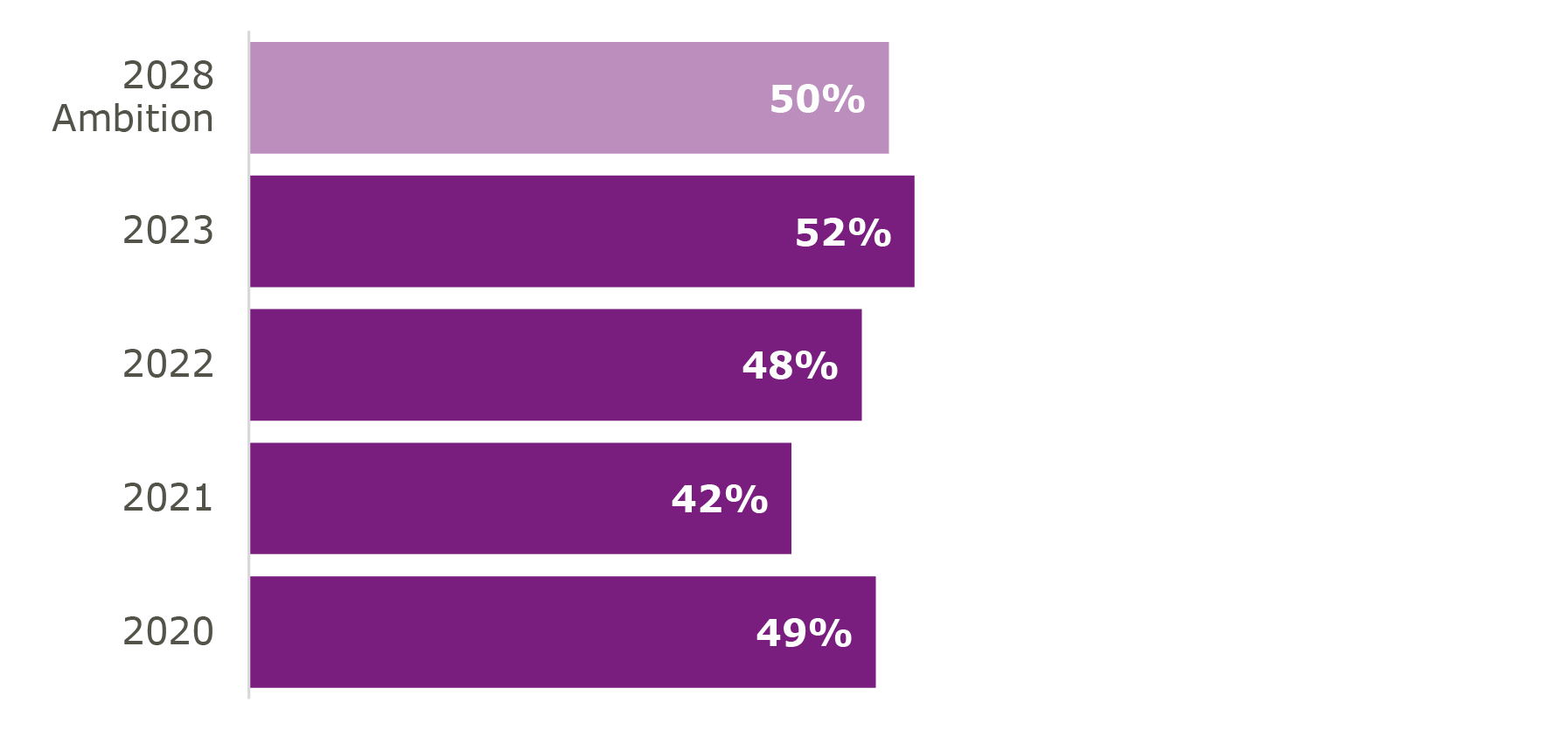
Through recruitment, pay progression and promotion, our ethnicity pay gap has more than halved since 2020 and we have decreased our gender pay gap. Our data shows that, on average, employees with disabilities get paid 1.9% higher than employees without disabilities. The profile of employees who have been successful in their career band assessment is in line with the profile of the ICO.
% of staff assessed for pay progression with protected characteristics
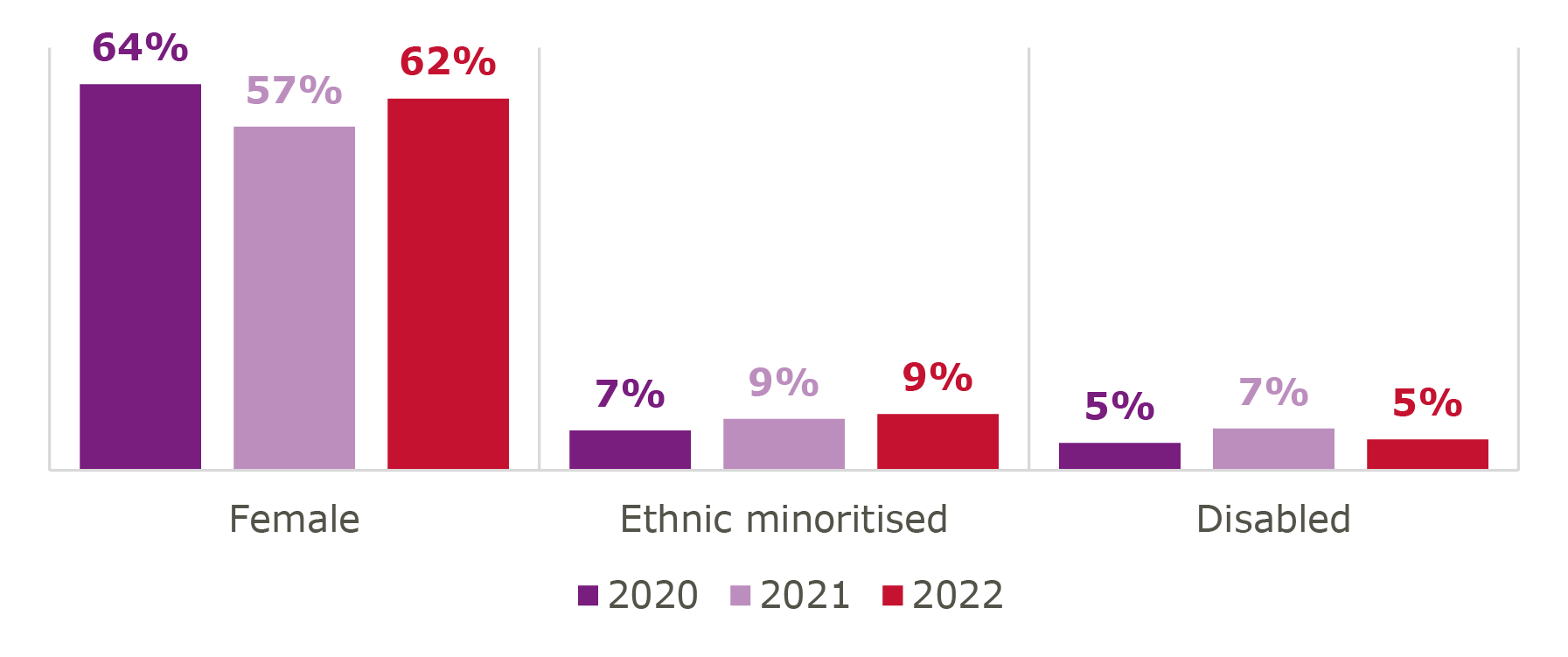
Pay gaps since 2020
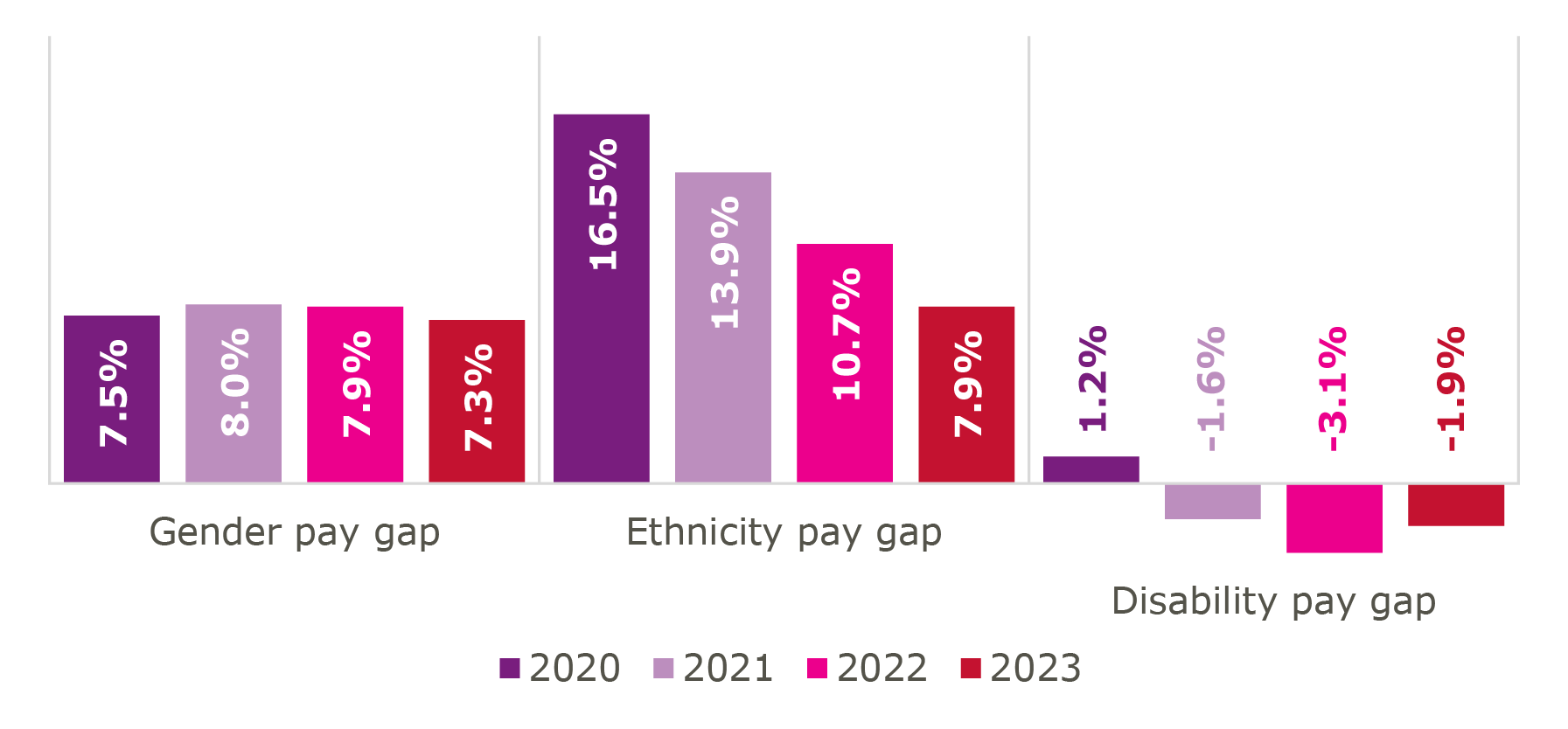
Our data shows that promotions for colleagues with protected characteristics are in line with the profile of the ICO. In some circumstances, the percentage of employees promoted had a higher level of protected characteristics than the ICO profile, such as female colleagues in 2022/23.
% of promotions in the last three years where colleagues with protected characteristics were successful
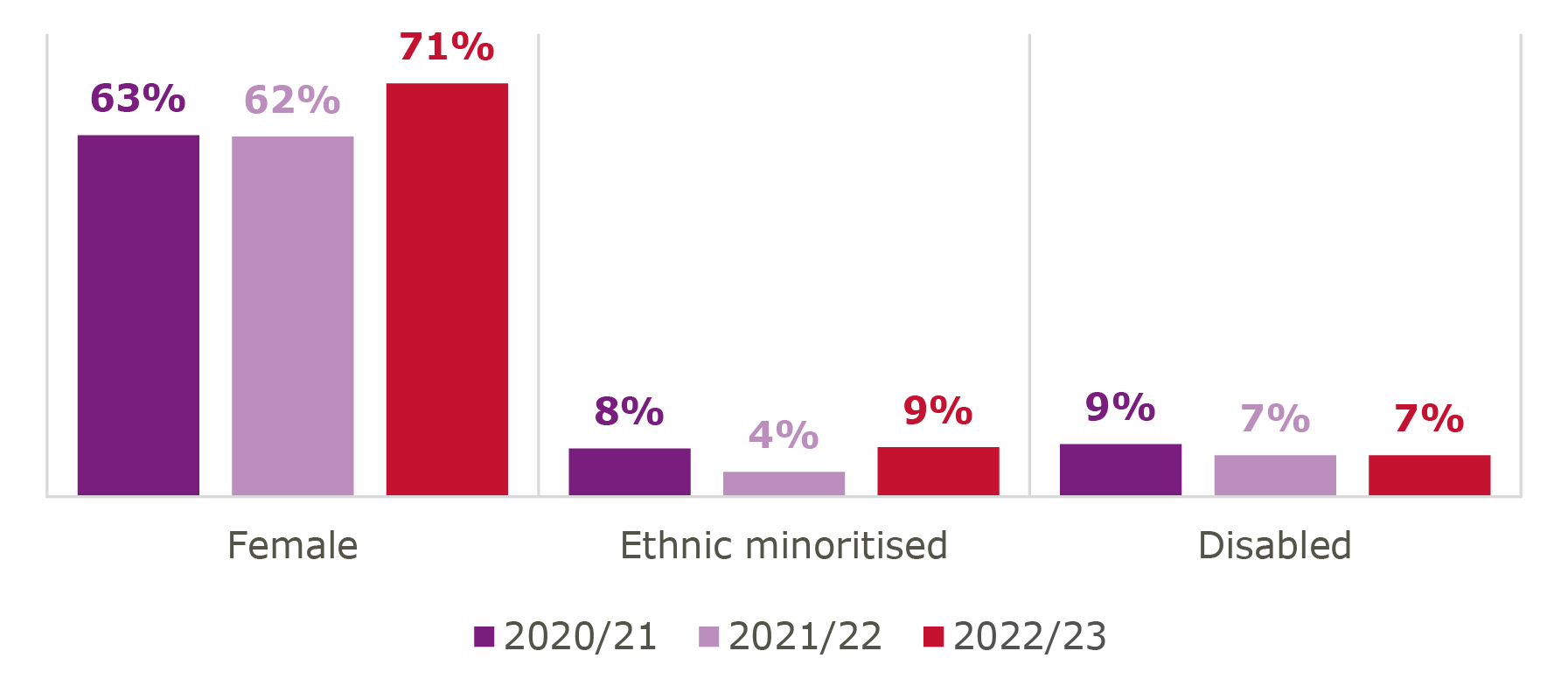
We made progress over the past three years to increase disability, ethnic minoritised and female representation at senior leadership level. A factor to this increase is our active commitment to widening our pool to attract people to the ICO, as well as promoting our employees internally.
We want to reach equal pay by 2028. To do this, we must continue to progress and evaluate our disability, ethnicity and gender pay gaps and measure the impact our initiatives and objectives have on improving these figures.